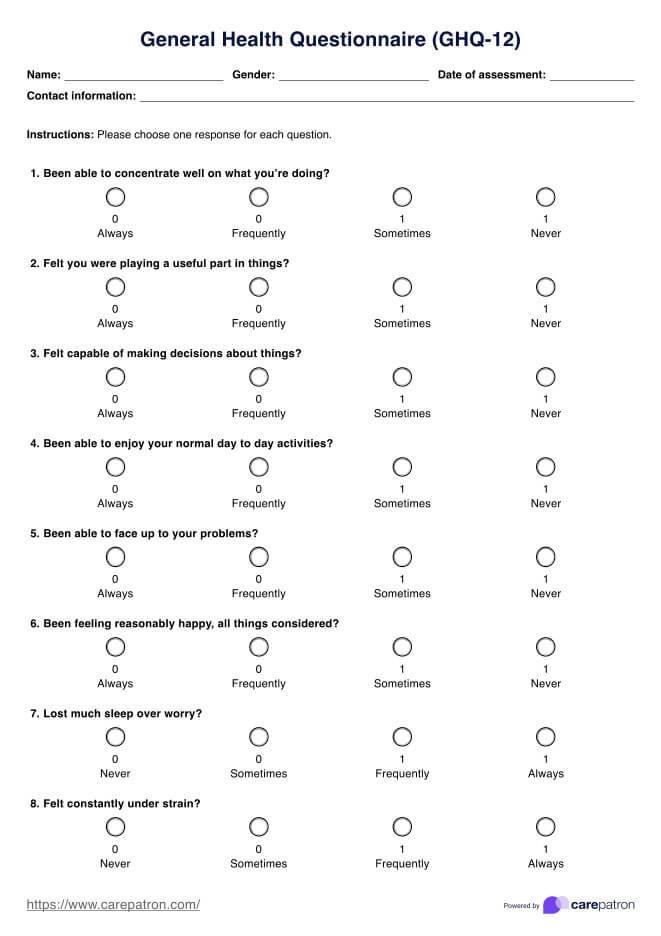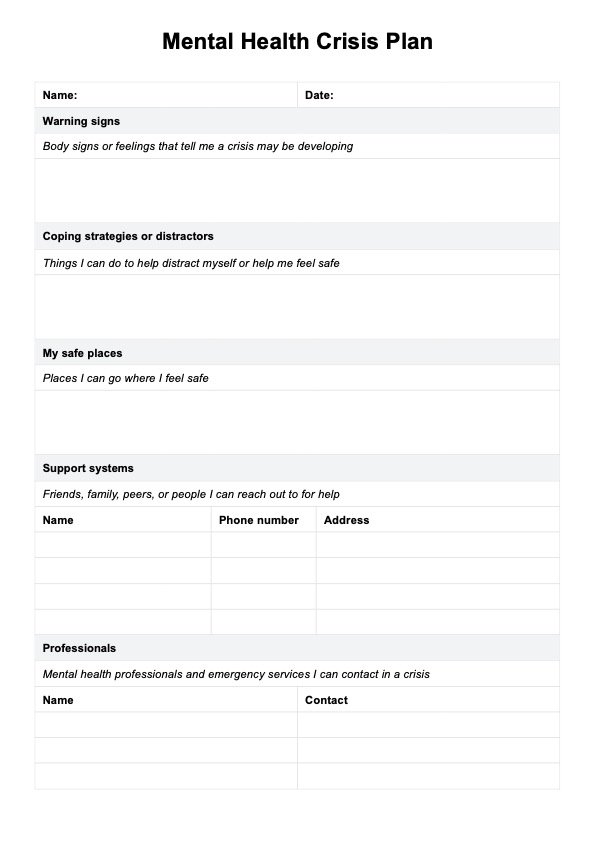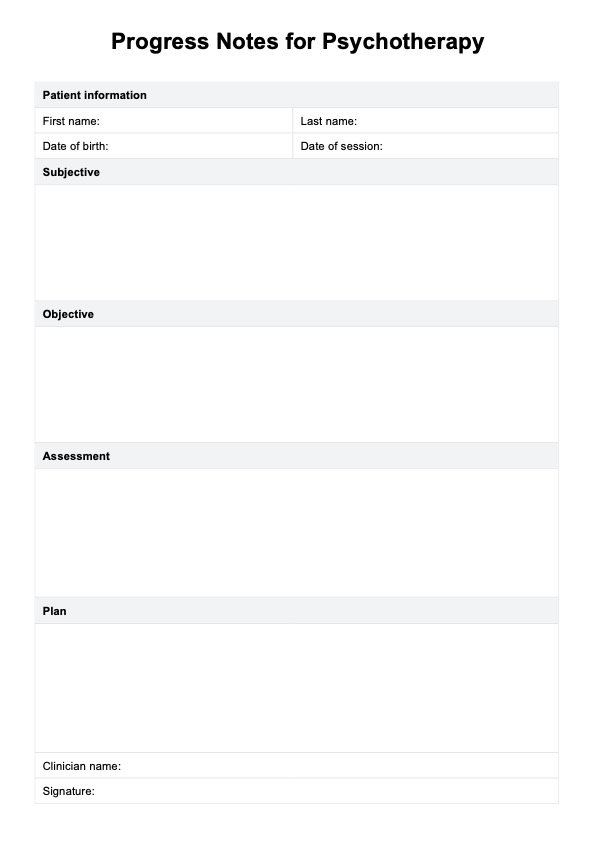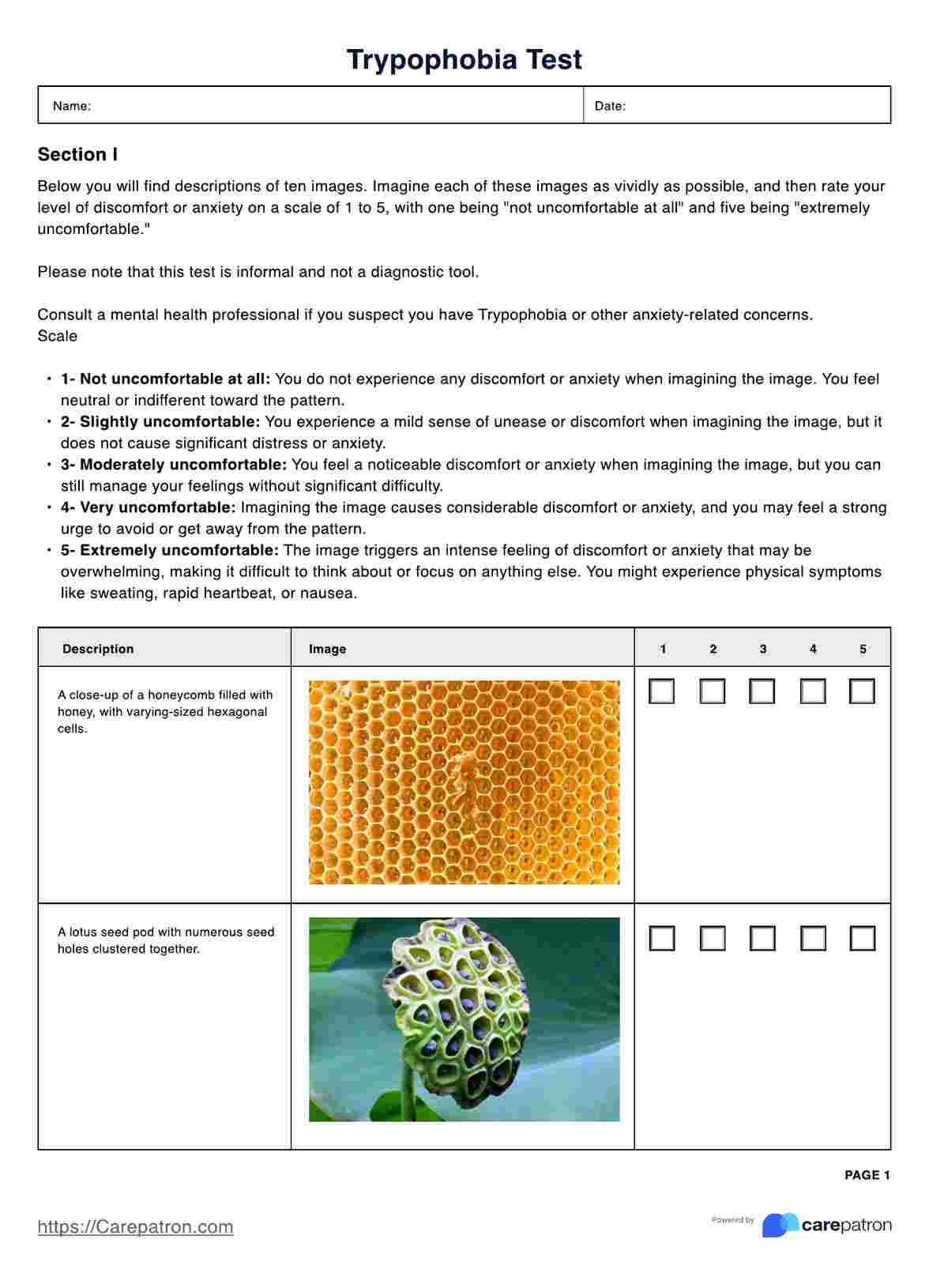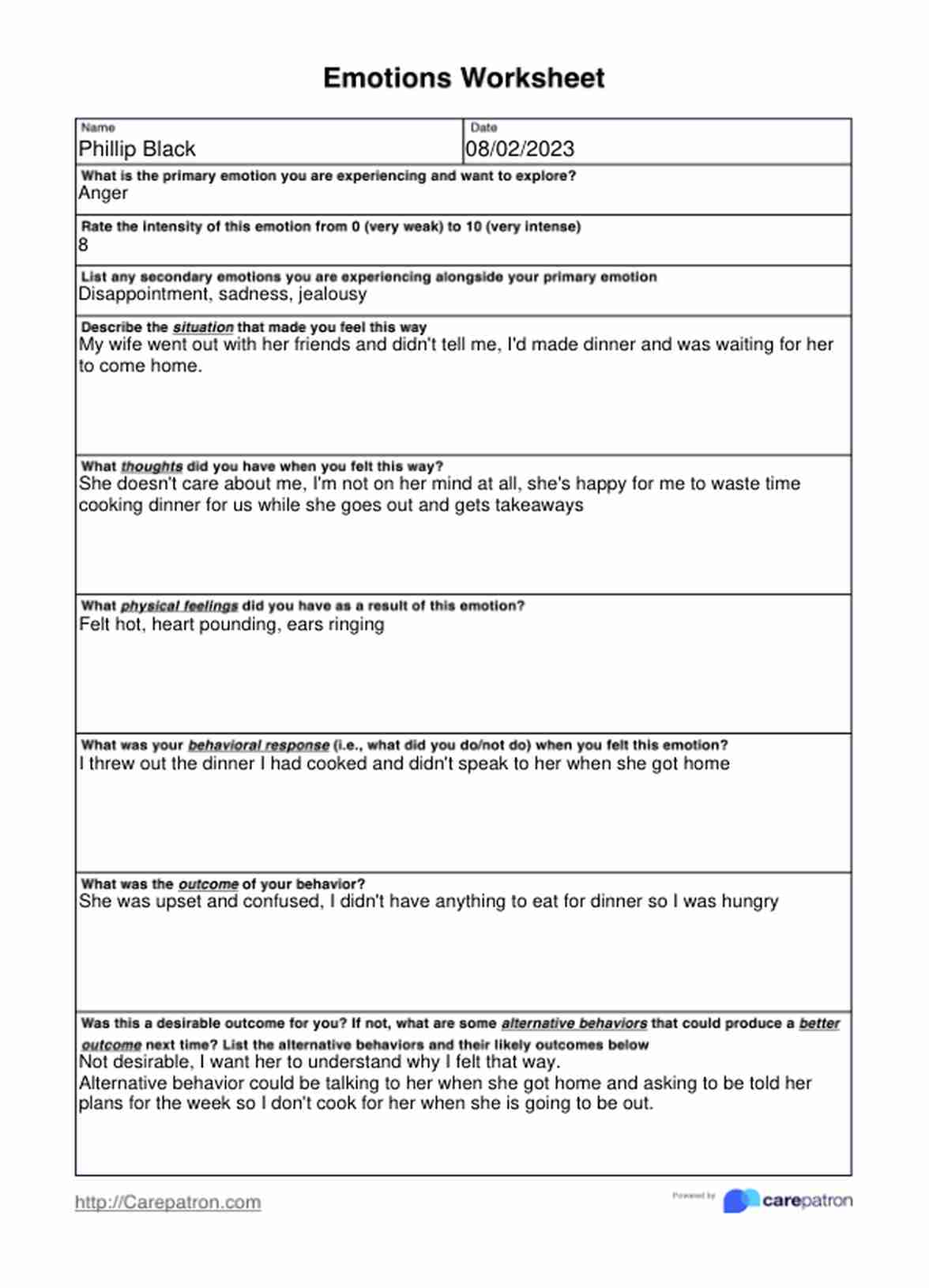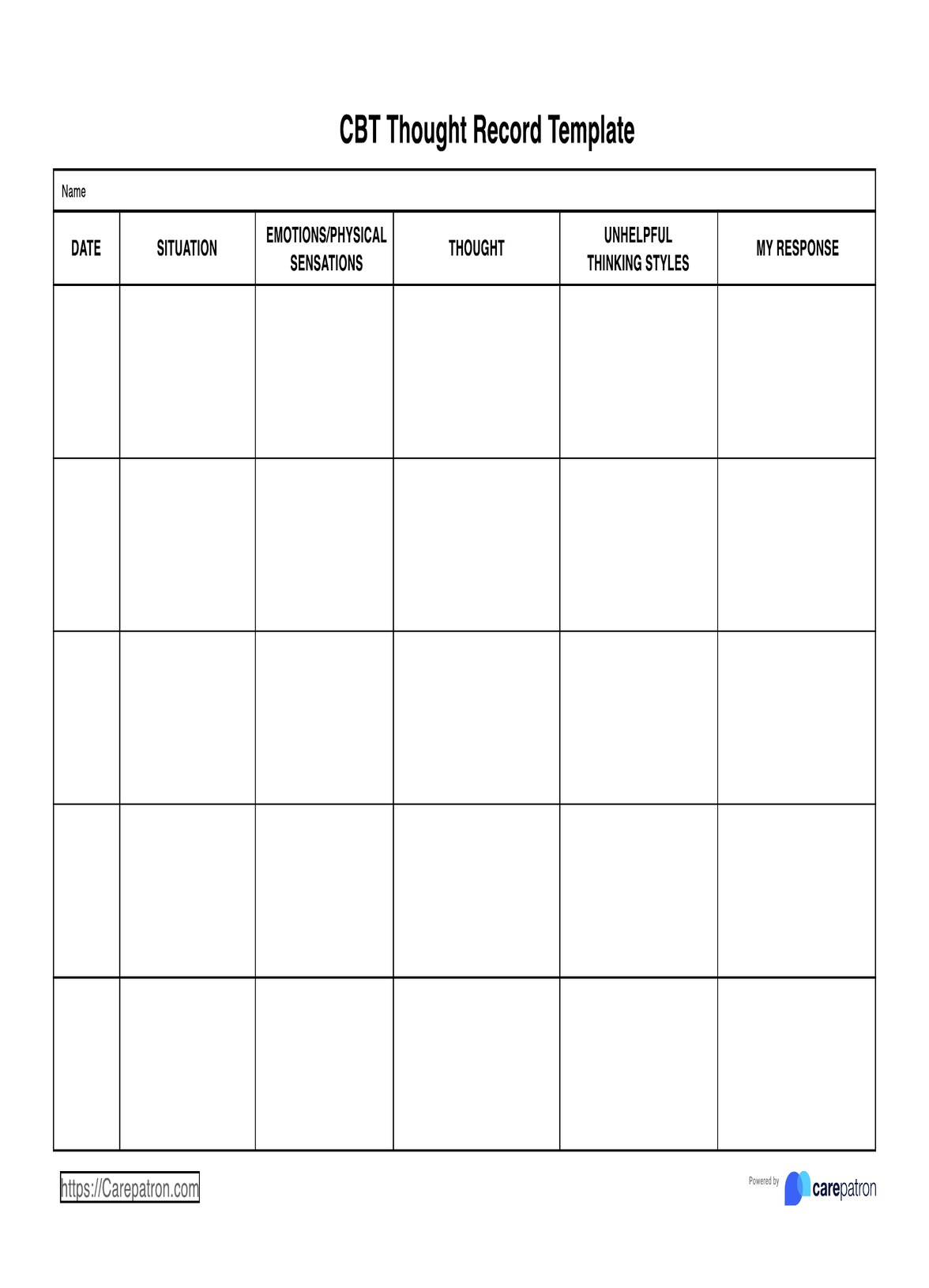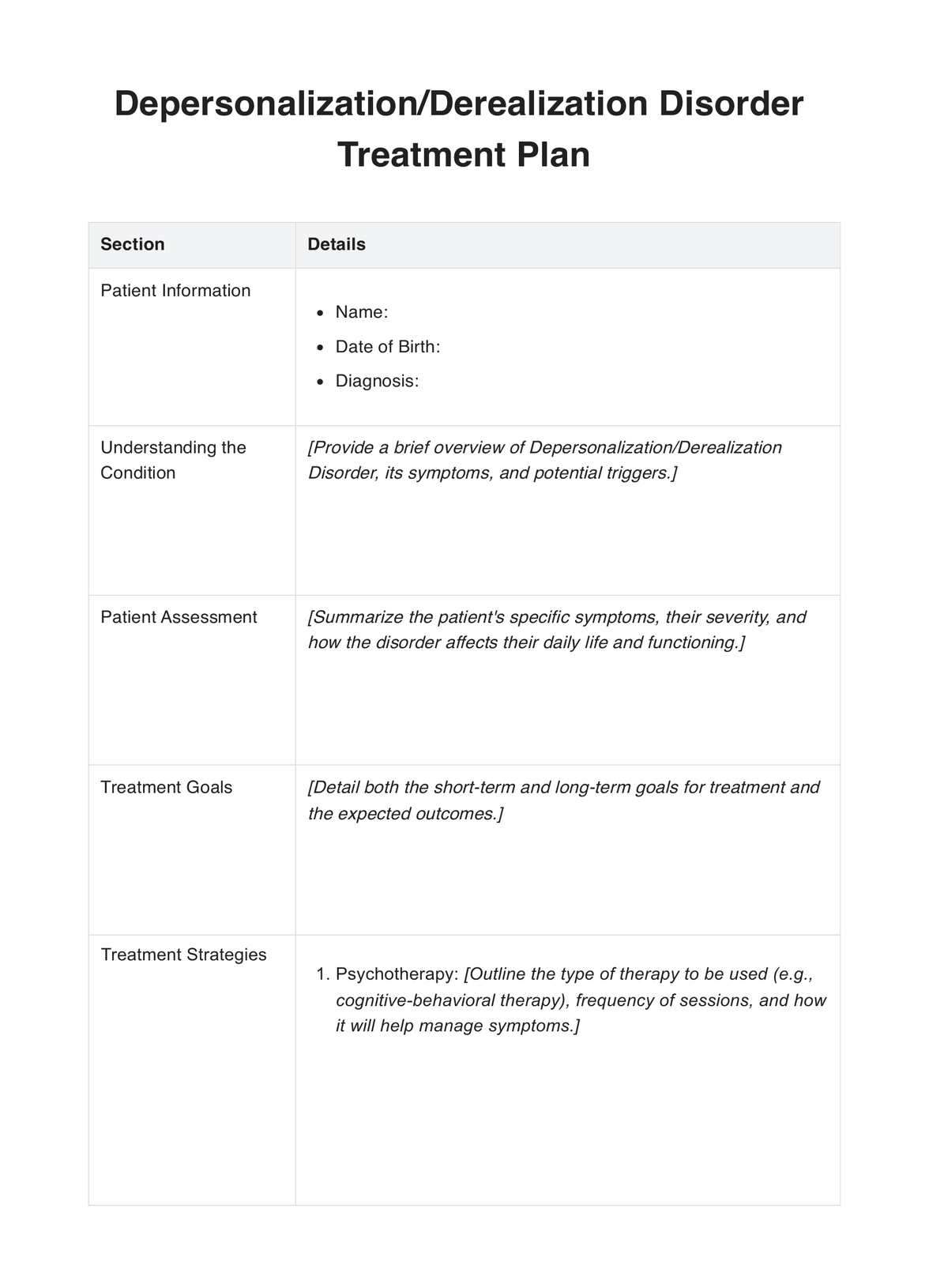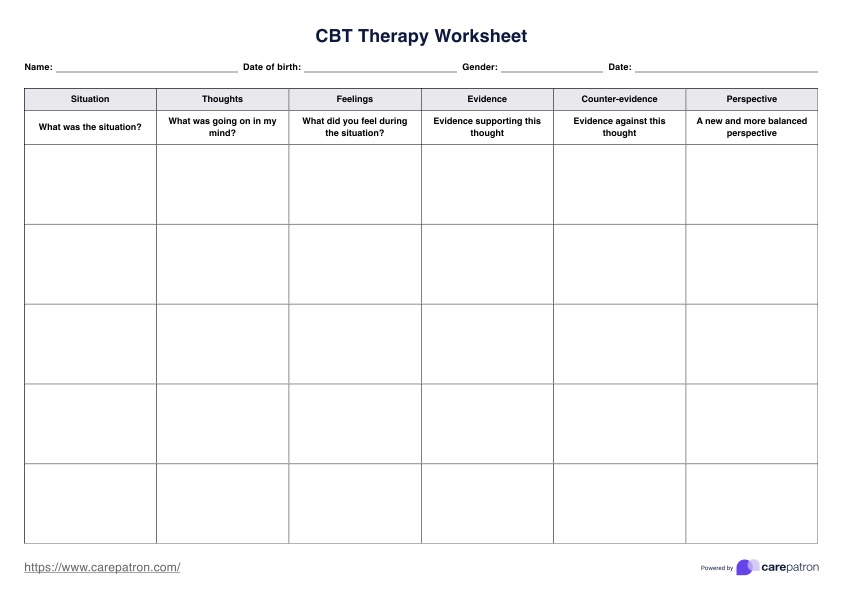Self-Awareness Test
Read our guide on the Self-Awareness Test, a valuable tool for enhancing self-understanding in therapy, ideal for healthcare professionals and life coaches.


An introduction to self-awareness
Self-awareness is the conscious understanding of one's own character, emotions, desires, and motivations. It involves recognizing one's strengths, weaknesses, and behavioral patterns. For instance, a person with high self-awareness may acknowledge their tendency to react defensively in conflicts and understand the deeper insecurities driving this behavior.
This introspective capability is crucial as it's the first step towards self-improvement. By being aware of one's own toxic traits or unproductive behaviors, individuals can actively work towards changing them. A self-aware person might recognize a pattern of dismissive behavior in relationships and understand that it stems from a fear of vulnerability.
However, lacking self-awareness can result in repeated negative patterns and an inability to grow personally and interpersonally. Without this awareness, individuals might continue harmful behaviors, unaware of their detrimental impact on themselves and others.
Self-awareness is more than just recognizing one's current state, like stress; it's about deep understanding and acknowledgment of one's entire persona, which paves the way for meaningful change and personal development.
Self-Awareness Test Template
Self-Awareness Test Example
The advantages of being self-aware
Self-awareness benefits individuals by showing them what problems they may need to solve and their strengths. Knowing these significantly enhances personal and professional aspects of life. Here's a deeper look at the advantages of being self-aware:
- Improved relationships: By understanding your own emotions and reactions, you can better navigate interpersonal dynamics, leading to healthier and more meaningful relationships.
- Enhanced decision-making: Self-aware individuals make more informed decisions because they understand their true desires and motivations, leading to choices that align with their core values and goals.
- Increased emotional intelligence: Enhanced emotional intelligence is a key benefit of self-awareness, as it involves recognizing your emotional triggers and responses.
- Personal growth and development: Understanding your strengths and weaknesses is essential for personal growth. Self-awareness enables you to identify areas for improvement and take steps towards personal development.
- Better communication: Being aware of your communication style and how it affects others can lead to more effective and constructive interactions in both personal and professional settings.
- Career advancement: In the professional realm, self-awareness helps understand your role within a team, your leadership style, and how you can contribute more effectively to organizational goals.
- Stress management: Recognizing what causes stress and how you react to it is crucial for effective stress management. Self-aware individuals can develop strategies to cope with stress more effectively.
- Enhanced self-esteem: Gaining clarity about who you are boosts self-confidence and self-esteem, allowing you to embrace your authentic self. It allows you to embrace your authentic self with all its strengths and limitations.
- Conflict resolution: Self-awareness aids in understanding the root causes of conflicts and navigating them more constructively.
The journey towards becoming more self-aware is ongoing and evolves. Embracing self-awareness can lead to a more fulfilled, balanced, and successful life.
Signs you need to evaluate your self-awareness
Recognizing the need to evaluate your self-awareness is crucial to personal growth. Here are some signs that might indicate it's time to reflect on your level of self-awareness:
- Frequent misunderstandings in communication: If you often find yourself in misunderstandings or conflicts due to communication, it might be a sign to assess how well you understand and convey your thoughts and feelings.
- Difficulty identifying your emotions: Struggling to pinpoint exactly what you're feeling, particularly negative emotions, or why you feel a certain way can indicate a lack of emotional self-awareness.
- Repeated negative patterns in relationships: Consistent issues in personal or professional relationships may be a sign of unrecognized behaviors or attitudes stemming from a lack of self-awareness.
- Feeling unfulfilled or stagnant: If you're feeling stuck or unfulfilled in your life, career, or relationships, it could be due to a misalignment between your actions and your true self, which self-awareness can uncover.
- Overreaction to criticism: Being overly defensive or upset in response to criticism can indicate a lack of understanding about one's weaknesses or growth areas.
- Impulsive decision-making: Regularly making decisions on a whim, without considering the consequences, suggests a need for greater self-reflection and awareness.
- Lack of empathy for others: Difficulty understanding or relating to the feelings and perspectives of others can be a result of not fully understanding one's own emotional processes.
Identifying these signs and enhancing self-awareness can lead to more informed decisions, healthier relationships, and overall personal growth.
How does this Self-Awareness Test work?
The Self-Awareness Test is a structured tool designed to help individuals gain insight into their behaviors, emotions, and thoughts. Here's how healthcare professionals can use this self-awareness quiz with their patients:
Step 1: Access our template
Access the Self-Awareness Test Template from the Carepatron app. It's structured to prompt introspection and reflection on various aspects of self-awareness. You can also edit and share it with patients and other health professionals via the app.
Step 2: Explain the template to the patient
Introduce the test to the patient, clarifying its purpose: to explore different facets of their self-awareness, from emotional intelligence to understanding personal behaviors.
Step 3: Guide through the test
Walk the patient through each section of self-awareness questions to ensure they understand the introspection required for each.
Step 4: Encourage honest and thorough responses
Motivate your patients to answer each question honestly and in detail. The effectiveness of the test relies on their willingness to engage deeply with each query.
Step 5: Discuss the responses
After completing the test, review the responses together. This discussion can provide invaluable insights into the patient's self-perception, emotional patterns, and behavior.
Step 6: Analyze the outcomes
Analyze the results to identify areas of strong self-awareness and aspects that might need further development or attention.
Step 7: Create an action plan and follow-up
Based on the insights from the test, work with the patient to develop a plan to enhance their self-awareness in areas that need improvement.
This test is instrumental in helping patients develop self-awareness, a critical step toward emotional and mental well-being.
Understanding the results
Interpreting the results of the Self-Awareness Test is a crucial step in the therapeutic process. Here's how healthcare professionals can help patients understand and utilize their test outcomes:
- Analyzing responses: Begin by reviewing the patient’s responses. Look for patterns in their self-perception, emotional awareness, and understanding of personal strengths and weaknesses.
- Identifying areas of strength and improvement: Highlight areas where the patient demonstrates strong self-awareness in their personal beliefs and identify areas needing improvement. For example, patients may clearly understand their emotional reactions but lack insight into how their behavior impacts others.
- Discussing emotional patterns: Discuss any recurring emotional responses or behaviors that emerge from the test. Understanding these patterns can provide significant insights into the patient's personality and coping mechanisms.
- Relating results to personal experiences: Relate the test results to the patient’s real-life experiences and challenges. This helps in contextualizing the insights and making them more relevant and actionable.
- Setting goals for development: Based on the test results, work with the patient to set specific goals for personal development, such as improving empathy, communication, or emotional regulation.
- Creating an action plan: Develop a tailored action plan with steps the patient can take to enhance their self-awareness. This might include mindfulness practices, journaling, or seeking feedback from others.
Understanding the results of the Self-Awareness Test can lead to transformative insights and significant personal growth. The insights gained from this test can complement other assessments, like the DISC personality test, in providing a comprehensive view of an individual's personality. It's a tool for patients to gain deeper self-knowledge and for healthcare professionals to provide more effective, personalized care.
Common techniques, activities, and exercises to improve self-awareness
Improving self-awareness is a continuous process that requires commitment and introspection. Here are some effective self-awareness activities and strategies for enhancing self-awareness:
Practice mindfulness
Engage in mindfulness exercises such as meditation or mindful breathing. These practices help in staying present and attuned to your thoughts and feelings. Own research into mindfulness and self-awareness can greatly enhance the effectiveness of these practices, too.
Journaling
Encourage writing daily or weekly journal entries focusing on personal experiences, feelings, and reactions. This practice can reveal patterns in thoughts and behaviors and aid in understanding underlying motivations. You can also use our Self-Awareness Worksheet and other types of insight quiz in this exercise.
Listening to feedback from others
Actively seek and be open to feedback from people around you. Understanding how others perceive you can reveal aspects of yourself you might not know.
Self-reflection
Allocate time for personal reflection. Consider your actions, reactions, and the motives behind them. Reflecting on your day or specific events can provide clarity.
Exploring your values
Identify and explore your core values and beliefs. Understanding what matters most to you can guide your actions and decisions.
Emotional intelligence development
Work on recognizing and understanding your emotions, as well as the emotions of others. This can be achieved through empathy exercises and active listening.
Challenging cognitive biases
Be aware of and challenge your cognitive biases and assumptions. This practice can help you see situations more objectively and understand yourself better.
Setting personal goals
Create goals based on your self-awareness insights. Goals should be aligned with your values and areas you wish to develop.
The 'Why' exercise
When making decisions or reacting to situations, ask yourself 'Why?' multiple times to delve deeper into the root causes of your actions and feelings.
Role-reversal
Try to put yourself in the other person’s shoes in conflicts or misunderstandings. This exercise can enhance empathy and provide insights into how your behavior affects others.
Personal SWOT analysis
Conduct a personal Strengths, Weaknesses, Opportunities, and Threats (SWOT) analysis. This structured approach can help in identifying areas for personal growth.
By engaging in these activities and exercises, individuals can develop a richer and more nuanced understanding of themselves, leading to improved self-awareness and overall well-being.
Benefits of this Self-Awareness Test
The Self-Awareness Test offers several key benefits, making it a valuable tool for healthcare professionals and their patients. Here's a look at some of these advantages:
- Enhanced self-understanding: The test helps individuals gain deeper insights into their personality, emotions, and behavior patterns, leading to a better understanding of themselves.
- Improved emotional intelligence: The test enhances emotional awareness by identifying emotional responses and triggers, a critical component of emotional intelligence.
- Facilitates personal growth: Understanding one's strengths, weaknesses, and values lays the groundwork for personal development and growth.
- Aids in conflict resolution: Increased self-awareness can improve how individuals handle conflicts, leading to more constructive resolutions.
- Better decision-making: With a clearer understanding of personal values and motivations, individuals can make decisions more aligned with their true selves.
- Enhances relationships: Self-awareness can improve communication and empathy, fostering stronger and more meaningful connections.
- Reduces stress and increases resilience: Understanding personal stressors and emotional reactions can help develop coping strategies, reduce stress, and build resilience.
- Clarifies life goals and aspirations: The test can help clarify what is truly important to an individual, guiding them in setting and pursuing meaningful life goals.
For healthcare professionals, this test can provide valuable insights into a patient's psyche, aiding in creating more effective treatment plans and therapeutic interventions.
Commonly asked questions
You can test your self-awareness using tools like Carepatron's Self-Awareness Test, which asks introspective questions about your emotions, behaviors, and reactions. Reflecting on these responses can reveal your level of self-understanding.
Being self-aware often means you clearly understand your strengths, weaknesses, emotions, and the impact of your actions on others. If you can accurately assess your feelings and behaviors and understand why you act in certain ways, it's a sign of self-awareness.
Self-awareness can be measured through psychological assessments, introspective exercises, and feedback from others. Tools like the Self-Awareness Test provide structured ways to evaluate how well you know and understand yourself.


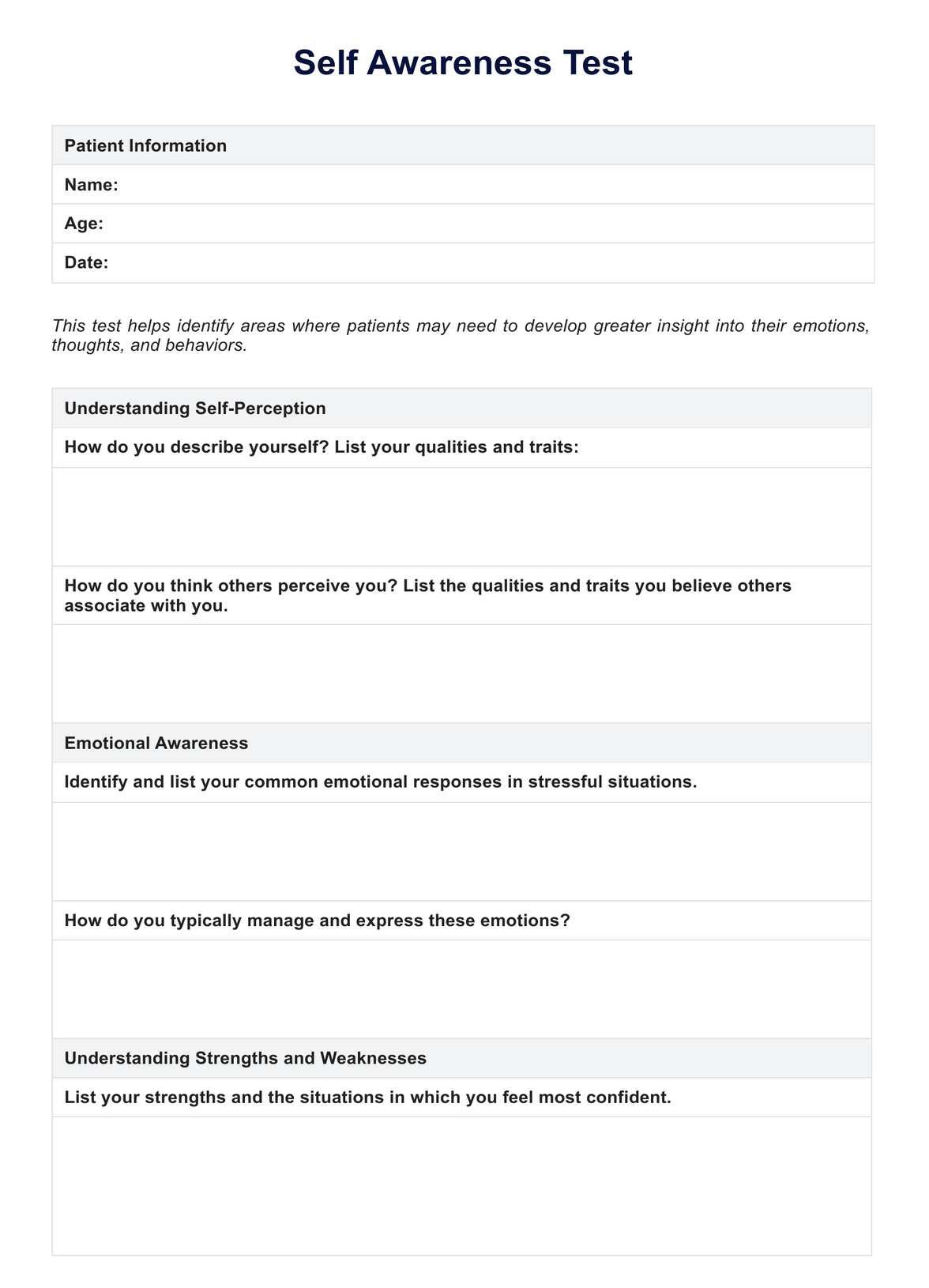
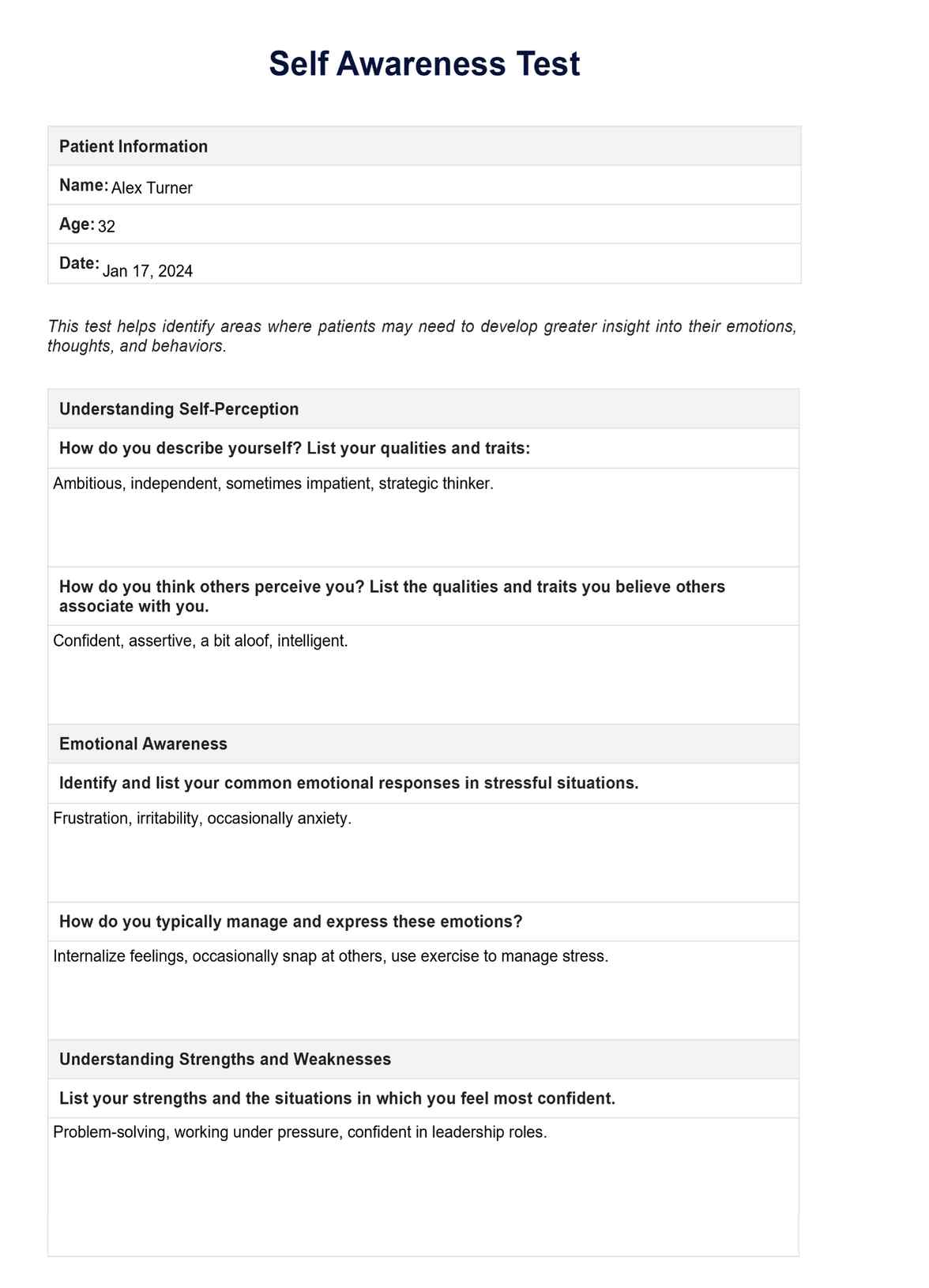

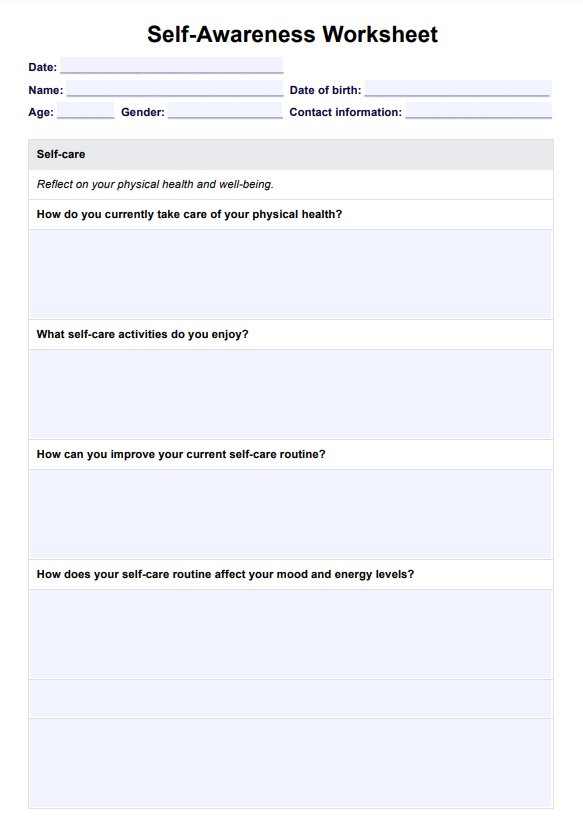
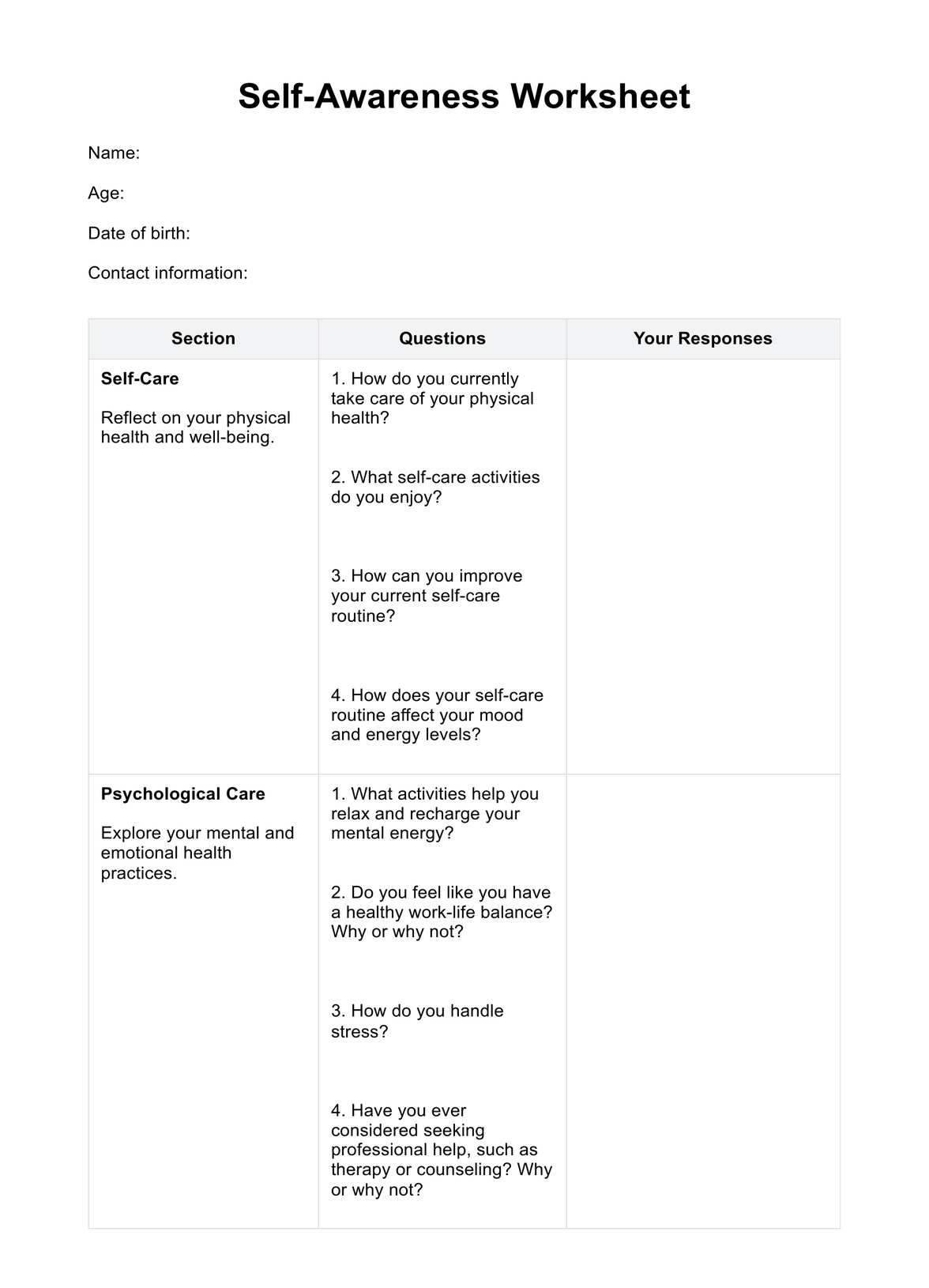
















-template.jpg)




















































































